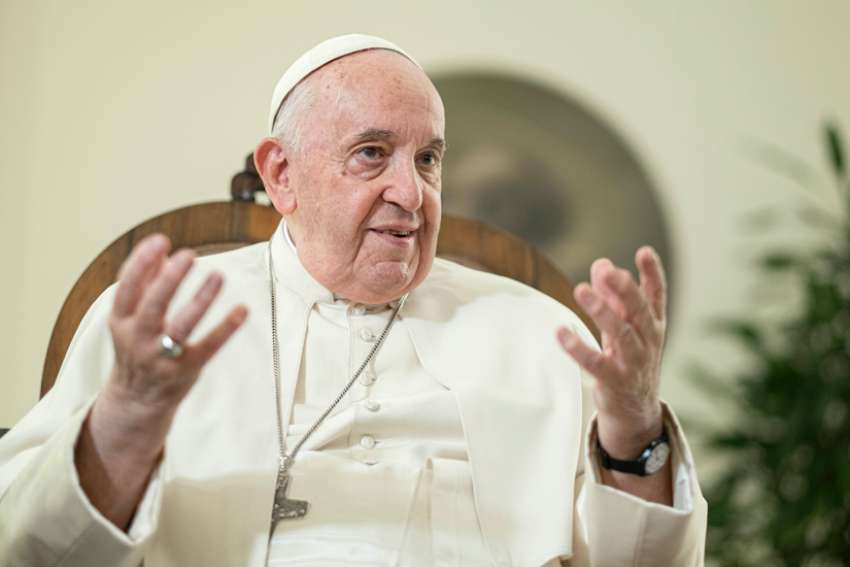VATICAN CITY -- Public criticism by cardinals and bishops is annoying -- "like a rash that bothers you a bit," Pope Francis said -- but differences need to be aired and criticism can be helpful, he told the Associated Press.
"You prefer that they don't criticize, for the sake of tranquility," he said in the interview conducted Jan. 24 and published the next day. "But I prefer that they do it because that means there's freedom to speak."
The papacy is not a dictatorship, he said, and, besides, "criticism helps you to grow and improve things."
The AP interview with the pope also covered topics ranging from his health to the ongoing clerical sexual abuse crisis and from homosexuality to potential policies for regulating the retirement of a pope who renounces his office.
Pope Francis said he had no role in lifting the excommunication in 2020 of Jesuit Father Marko Rupnik, a Slovenian priest and artist, who continues to have restrictions on his ministry after additional accusations of sexually, psychologically and spiritually abusing women in a religious order he helped begin.
And while he said he always orders the lifting of the statute of limitations when a cases involves someone who was a child at the time of the abuse, he does not when survivors were adults because justice demands respect for the idea that a person is innocent until proven guilty and that crimes must be prosecuted within a certain time limit.
In the discussion about homosexuality, Pope Francis said that "being homosexual is not a crime. It is not a crime." And he defined as "unjust" laws that criminalize homosexuality or homosexual activity.
According to church teaching, homosexual activity is sinful, the pope said, but, as the Catechism of the Catholic Church teaches, gay people must be respected and welcomed and not marginalized or discriminated against.
"We are all children of God, and God loves us as we are and for the strength that each of us fights for our dignity," the pope said.
Being gay "is not a crime," he said. One could say, "'Yes, but it's a sin.' Fine, but first let's distinguish between a sin and a crime."
"It's also a sin to lack charity with one another," he added.
In the days following the death of Pope Benedict XVI, Archbishop Georg Gänswein, the late pope's secretary, published a book that included criticisms of Pope Francis, including because of the way he treated Archbishop Gänswein, but also because of his decision to limit celebrations of the Mass using the pre-Vatican II liturgy.
Then, shortly after Australian Cardinal George Pell died Jan. 10, two texts attributed to him and critical of the pope -- one calling his papacy a "catastrophe" -- came to light.
"Even though they say he criticized me, fine, he has the right," the pope said when asked about Cardinal Pell. "Criticism is a human right."
At the same time, he said, the cardinal "was a great guy. Great," and he did much to begin the process of reforming Vatican finances.
Pope Francis objected to the idea that criticism has increased since Pope Benedict died and that somehow it is related to the late pope no longer being around to quiet the critics.
Instead, he said, it seems to be a natural part of "the wear-and-tear" of his papacy, which is nearing its 10th anniversary. In the early years, he said, everything was new and exciting, but the criticism began "when they started to see my flaws and didn't like them."
As he had done shortly before Pope Benedict's death, Pope Francis also told AP that he had no plans to issue norms for how a retired pope should live and dress and what he should be called.
But, he said, if he were ever to resign, he would insist on being referred to as the emeritus bishop of Rome and he would live in a Rome diocesan residence for retired priests.
Pope Francis insisted he is "in good health," at least "normal" for his age, which is 86. His knee has healed, he said, but he told AP that he again is suffering from diverticulosis, or bulges in his intestinal wall, a condition for which he underwent surgery in 2021.
The day after the publication of a letter from top Vatican officials criticizing the plan of the German Catholic "Synodal Path" to set up a "Synodal Council" of bishops and laypeople to deal with national issues facing the church, AP asked the pope about his view of Germany's synodal process, which began in 2019. The process has focused on four areas a major study identified as containing the "systemic causes" of sexual abuse and its cover-up: the exercise of power in the church; sexual morality; priestly existence; and the role of women in the church.
But Pope Francis told AP the German process seemed to be "elitist" because it involved mainly bishops, theologians and laity invited to participate by the bishops' conference and the country's Central Committee of German Catholics. And, he said, it could become "ideological," which is dangerous because "when ideology gets involved in church processes, the Holy Spirit goes home."


